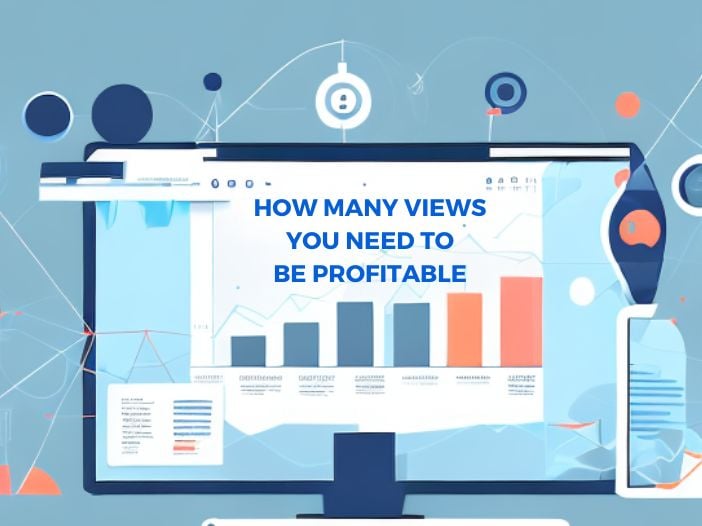While some websites are created solely for informational purposes, most website owners aim to generate revenue from their sites.
One of the key metrics used to determine website profitability is the number of views or visitors to the site.
Some site owners chase profit for years without ever reaching their goal of creating a sustainable website that gives them significant ROI, if any, return at all.
I don’t want that for you.
In this article, I will explore the factors determining the number of views required for a website to become profitable.
Understanding website profitability
The profitability of a website is determined by the revenue earned from the site minus the costs of operating and maintaining the site.
So it will be unfair to you to give you exact figures with there being so many variables, but I’ll help you determine how to figure out how many views you’ll need based on your project.
Website owners use various strategies to monetize their sites and generate revenue.
Some popular monetization strategies used by niche websites include advertising, affiliate marketing, selling products or services, and subscription-based models.
Each strategy has its own unique requirements in terms of website traffic and engagement in order to generate profits.
Advertising is a common way to generate revenue for websites.
This can include display ads, sponsored content, or pay-per-click ads.
Affiliate marketing involves promoting products or services on your website and earning a commission for each sale through your unique affiliate link.
Selling products or services directly on your website can also be profitable, especially if you have a strong brand and loyal customer base.
Subscription-based models, such as memberships or premium content, can provide a consistent source of revenue for websites.
Defining profitability for your website
Before aiming to create a profitable website, defining what profitability means to your website is essential.
Are you aiming to make a full-time income from your site, or is the site meant to serve as a supplementary income?
Are there specific costs associated with your site, such as hosting fees, marketing expenses, or content creation costs?
Answering these questions will help you determine the number of views required to reach your profitability goals.
It’s essential to keep in mind that profitability can vary depending on the industry and niche that your website operates in.
For example, a website in the finance industry may have a higher profitability threshold than a website in the food industry.
Additionally, the level of competition in your niche can impact your profitability.
If you’re in a highly competitive niche, you may need to invest more time and resources into your website to stand out.
Factors affecting website profitability
Several factors impact the profitability of a website, including the niche it operates in, the target audience, and the competition.
The profitability requirements for a website in the tech industry differ significantly from those for a website in the fashion industry.
Understanding the impact of these factors can help you set realistic expectations and develop effective strategies to drive website traffic.
Other factors that can affect website profitability include:
- The quality of your content.
- The user experience of your site.
- Your marketing efforts.
Creating high-quality, engaging content can attract and retain visitors to your site. Ensuring your site is user-friendly and easy to navigate can also improve the user experience and encourage visitors to stay on your site longer.
Creating an effective marketing plan, such as social media promotion and search engine optimization, can help increase your website’s visibility and drive traffic to your site.
Understanding website profitability requires defining your goals, identifying your niche and target audience, and developing effective monetization and marketing strategies.
Considering these factors, you can create a profitable website that provides value to your visitors and meets your financial goals.
Importance of website traffic
Website traffic plays a vital role in determining the profitability of a website.
The more traffic your site receives, the higher your revenue potential.
However, it’s essential to note that not all traffic is created equal, and quality traffic is more likely to drive conversions and generate revenue than low-quality traffic.
One way to increase website traffic is through search engine optimization (SEO).
SEO involves optimizing your website to rank higher in search engine results pages (SERPs) for relevant keywords.
By ranking higher in SERPs, your website is more likely to receive organic traffic from people searching for information related to your content or products.
This is a long-term strategy as SEO sometimes takes months to see any significant traffic that would bring in profits for your website.
But once SEO kicks in, you can reap the benefits for years.
The relationship between traffic and revenue
The relationship between website traffic and revenue depends on the monetization strategy used for the website.
If your site generates revenue through advertising, you’ll need a large traffic volume to generate significant income.
On the other hand, if your site generates revenue by selling products or services, you may require fewer visitors but higher quality traffic to generate a profit.
Another way to increase website traffic is through social media marketing.
You can drive traffic and increase brand awareness by promoting your website on social media platforms like Facebook, Twitter, and Instagram.
Social media marketing can help you reach a broader audience and engage with potential customers.
Quality vs. quantity of website traffic
While website traffic quantity is essential, it’s also vital to prioritize the quality of the traffic.
Quality traffic refers to visitors genuinely interested in your content, products, or services and is more likely to engage or convert.
Low-quality traffic may lead to high bounce rates and low engagement, resulting in poor revenue generation potential.
One way to attract quality traffic is by creating high-quality content that is relevant and valuable to your target audience.
By providing valuable content, you can establish yourself as an authority in your industry and attract genuinely interested visitors.
Website traffic is crucial for the success of any website. By focusing on the quantity and quality of traffic, you can increase your revenue potential and achieve your business goals.
Conclusion
The number of views required for a website to become profitable depends on several factors, including the site’s goals, niche, target audience, and competition.
Understanding these factors and using effective monetization and digital marketing strategies can increase your website’s traffic and revenue generation potential.





